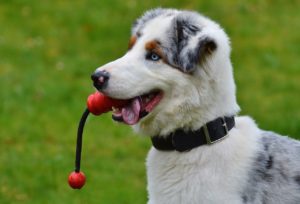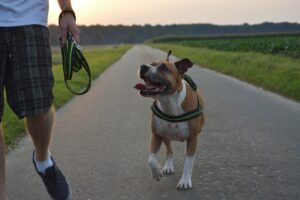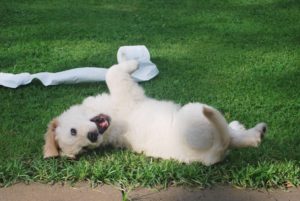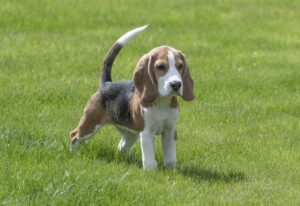Maybe dog owners think it’s normal for dogs to have bad breath. And for this reason, many dog owners don’t brush their dog’s teeth frequently enough. Some don’t even do it at all. The importance of good dental hygiene is often neglected when it comes to dogs. Yet, your dog’s dental hygiene is an important part of your dog’s overall health. Just like us, dogs need dental care to prevent tooth decay which can trigger further health problems. Your dog cannot brush its own teeth – but there are many things that YOU can and should do to keep your dog’s teeth healthy.
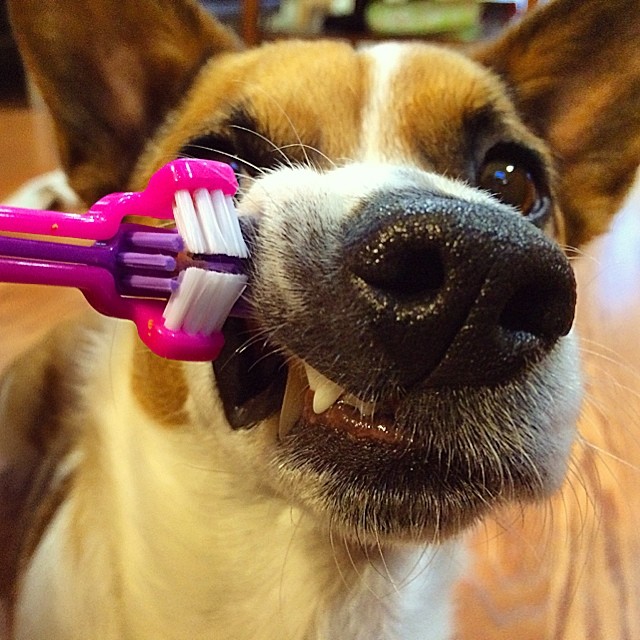
Neglecting your dog’s dental hygiene is nothing less than opening Pandora’s box
If your dog’s teeth aren’t cleaned regularly, plaque will start to build up on the teeth and it will turn into tartar eventually. Tartar is also called calculus, which you will find many articles on (no, not your favourite subject at school :) ). These areas will become a great environment for bacteria that eat away healthy teeth and gums. This makes your dog susceptible to halitosis, periodontal disease, oral pain, and tooth loss. However, bacteria not only causes disease in the mouth but it can also affect other parts of the body, like the heart and kidneys. Taking care of your dog’s teeth is just as important as proper nutrition, regular exercise and training.
Natural teeth cleaning
Surprise, nature has thought of everything and even of your dog’s dental hygiene! In this case, bones. Raw bones can indeed scrape teeth clean. So if your dog eats bones regularly, you are likely not to have to do anything considering his dental hygiene. The chewing will clean your dog’s teeth on its own. The best bones are uncooked and large.
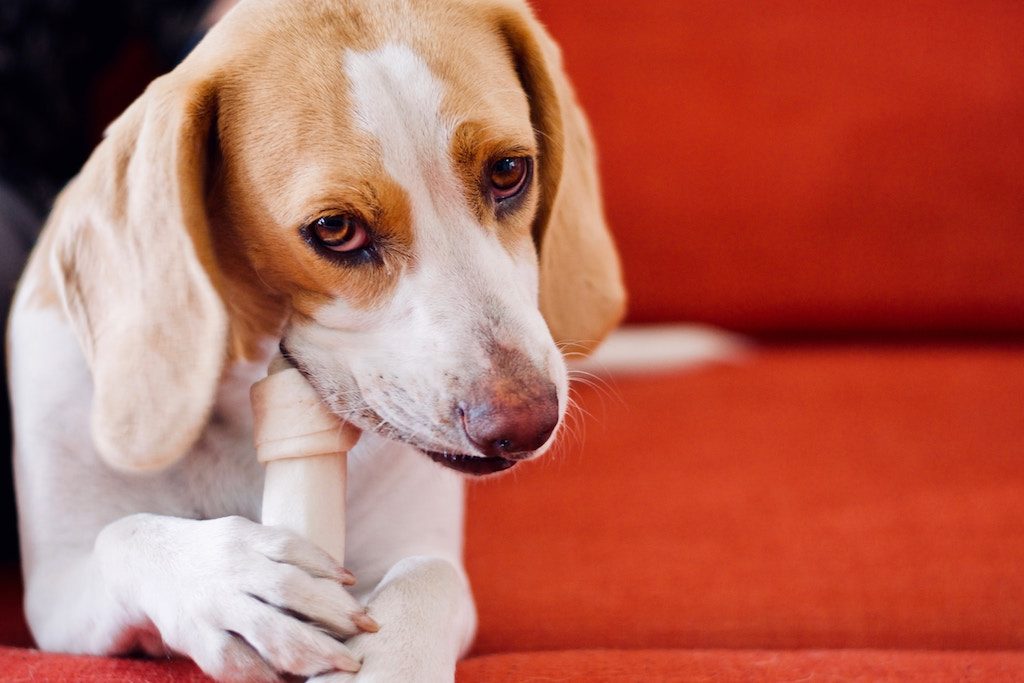
Cooked bones are a big NO as they can splinter and cause irreversible damage to your dog’s stomach. So, if you have a large dog that enjoys eating raw bones, good for you! But problems arise with toy size dogs which do not have the stomach for bones. For this reason, some veterinarians argue against the whole bone-chewing idea, so if you want a second opinion, ask your vet first.
Dental dog chews
While somewhat helpful, dental chews and rinses are usually only partially effective. The rule is that dental chews should be easily digestible and size-appropriate. If the chews are healthy, don’t be afraid to use them as an aid but keep in mind that they are not in itself sufficient to resolve the problem. Typically, dental chews need to be given on a daily basis in order to be effective and should be large enough that your dog has to chew on them a bit before swallowing. You should look for a chew made with high quality ingredients, free from artificial additives and also one that is somewhat flexible so it poses little risk for GI obstruction if he swallows larger pieces of it. When they are tasty, it is next to impossible for this not to happen at some point…
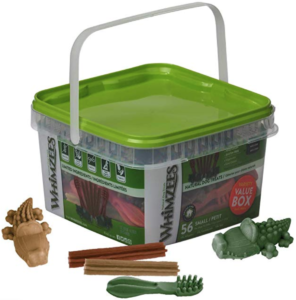
Sprinkle dental mixes on your dog’s food
Generally, these products are always a good idea and for other reasons besides your dog’s dental hygiene. Just make sure that they are yeast-free and as healthy as possible. A possible option is Phytopet Tartar X, containing only parsley and peppermint for fresh breath.
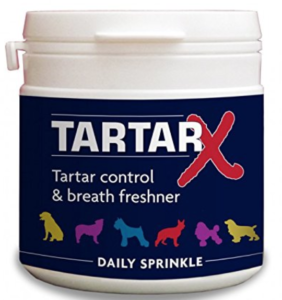
But magnesium and iodine are also important to help maintain healthy teeth and gums and also skin and coat, and thyroid function. Then, there are polysaccharides to help support healthy oral bacteria and prevent acid erosion of the teeth’s enamel. Neem is known for its healing benefits, helping reduce plaque and eliminate odour causing bacteria. And there is fragaria, traditionally used for tartar control and gum disease treatment.
Dental additives for dog’s water
Clinically approved additives also need to be used daily. Needless to say, you need to make sure your dog has access to fresh water. But make sure you ask your vet for the ingredients. Some dogs that have high blood sugar levels or other health problems such as allergies are not advised to use these additives. Essentially, they are harmless but you need to be careful to avoid some additives like xylitol, which is an artificial sweetener known to cause trouble such as hypoglycemia. And don’t forget: additives do not replace brushing!
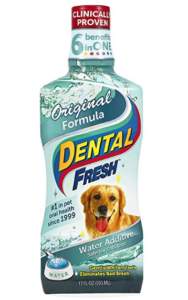
Teeth cleaning – done by you
Toothbrush and toothpaste are among the essential ‘must have dog items’. Now, there are several kinds of tooth brushes. Very long ones, those that you put on your finger, etc. You want a tooth brush that is soft so it doesn’t hurt your dog’s gums but that does the job. So you need to reach even the ‘unreachable’ areas and preferably, not get bitten in the meantime. There are also many kinds of toothpaste. Ideally, it should have a nice flavour so your dog likes it. But it also needs to do the job which is why many people opt for enzymatic toothpastes.
If your dog won’t let you brush his teeth… there’s still hope!
There is also an option of using a spray or a gel for all those who struggle brushing their dog’s teeth. Though brushing is not required with a dental gel, it may help to speed up the results. You simply apply it once in the evening and withhold food and water for about 30 minutes for it to work. The gel essentially blends with saliva to start breaking down plaque and tartar. Without brushing, your dog may need daily treatment for 30 days after which you can maintain your results with twice-weekly applications. And literally, comments of satisfied dog owners speaking are all over the internet with products like TropiClean Fresh Breath gel which is made of natural and holistic ingredients.
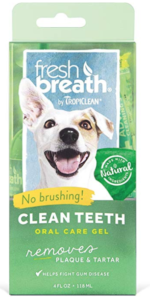
DIY Products
Emmi pet has thought of a revolutionary product, an ultrasound brush that requires no brushing. You put the brush on your dog’s teeth and wait for it to work. Although many dog owners swear by it, saying they no longer need any professional cleaning, its price will surely turn off many with its price tag. Then again, if your dog needs professional cleaning, it might be worth the investment. Not to mention the fact that it won’t have to go under general anesthesia and you can obtain the same results as with professional vet cleaning.
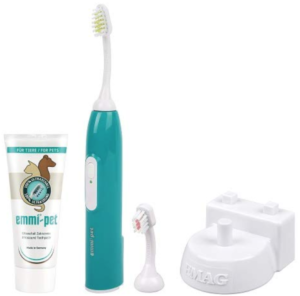
There’s a potential drawback…
But even if this product is in your price range, you should note that smaller teeth are more difficult to clean. Also, your dog will have to stand still for quite some time while the brush does its job. Unlike regular brushing, you will need to keep this ultrasound brush placed on each tooth for some time for it to do its magic. Can your dog handle it? This is quite a challenge for many dogs. So going back to puppyhood – start with a dental hygiene routine ASAP!
Professional teeth cleaning – done by your vet
Some dogs need dental cleaning one or more times per year while others can go longer. The more you work at it, the less the vet will have to intervene. For a thorough, complete cleaning, the gums also need to be inspected. This isn’t something that should be done while the dog is awake. It won’t be painful but the noise of the machine removing tartar is something most people hate, and dogs even more. And that’s the biggest reason behind general anesthesia as the last thing anyone wants is to traumatise your dog.
How does it work?
The teeth are cleaned with an ultrasonic scaler that vibrates at a high speed to remove large pieces of plaque and tartar. A hand scaler is used to clean under the gum line of every tooth and on all sides of the tooth. Once all plaque and tartar are removed, the mouth is rinsed and all tooth surfaces are polished. Teeth need to be polished as small etchings left on the teeth from cleaning can only attract more plaque and tartar. After polishing, the mouth is rinsed again and a fluoride treatment can be applied. Its high cost is mostly due to anesthesia. Unfortunately, you cannot explain to your dog that the scary sound and uncomfortable feeling are entirely harmless… we all know how terrified they get by only visiting the vet!
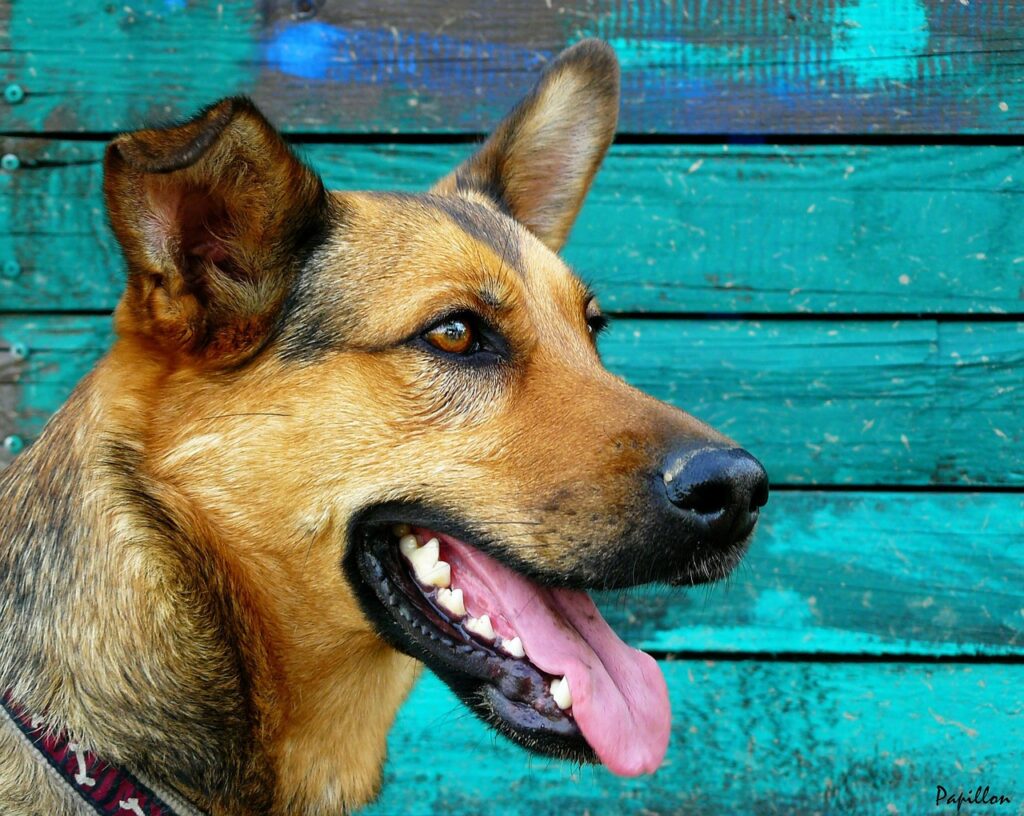
The fear surrounding general anesthesia – it is common vet practice for teeth cleaning
There is no reason to fear general anesthesia, when it is done right. No doctor will take a patient that is too risky and your vet won’t either . Many dog owners fear that their dogs won’t wake up but your vet should insist on doing a blood test to assess the health of vital organs and check your dog for any allergies to make sure that the procedure will be safe. But of course, work on your dog’s dental hygiene so he or she doesn’t need this so often! There are myths of dogs having perfect, white and clean teeth throughout their lives, without vets cleaning their teeth but in 99% of those cases, their owners’ efforts are to thank. So do your best to be one of those dog owners so your best furry friend can live a long and healthy life by your side – smiling :)



